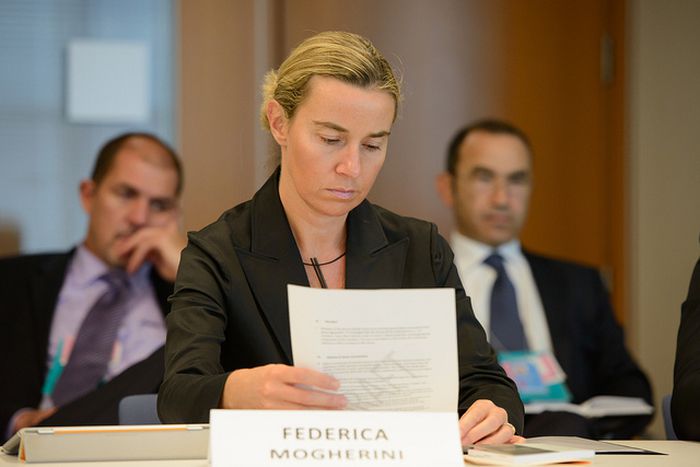
EU TOP JOBS: ONLY SHORTLISTED CANDIDATES WILL BE CONTACTED
Published on
The European Union count on 25 million people out of work, but only few of them will have access to the top jobs in the EU Institutions. On July the 16th the 28 Heads of State were supposed to decide about at least one position: the Foreign Policy Office. However it has been impossible to reach an agreement. The successful candidate would be contacted on August the 30th.
After the not so easy negotiation about Jean-Claude Juncker as President of the European Commission and the controversial nomination of Martin Schulz as President of the European Parliament, now it is time for the other three EU top jobs: the head of the Foreign Policy, the European Council and the Eurogroup.
First things first. It is necessary to appoint the High Representative of the Union for Foreign Affairs and Security Policy before any other position. Italy has this chair reserved after the victory of the Italian ruling party Partito Democratico in May's European Elections. The Italian PM Matteo Renzi has proposed his Foreign Affairs Minister Federica Mogherini to replace Catherine Ashton, for the next five years.
At the age of 40, Mogherini has been the head of the Italian diplomacy since February however she did not count on the support needed to succeed during the last European Council.
Matteo Renzi and his Partito Democratico are increasingly taking over control of the EU sphere. Thirty one out of one hundred nighty one S&D MEPs are from the country known for their pizza and pasta. Now it is time to see if the weight of the Italians in the European Parliament takes its counterpart in the European Commission, since the post targeted by Italy implicates also a Vice-Presidency of the executive arm of the EU, the Commission.
The negotiation of the latest summit did not have any result in terms of giving away the roles. The current president of the Council, Herman Van Rompuy, is looking for a consensus in the nomination of these posts, nevertheless that consensus has not been reached. Mogherini has in her favour the fact of being a woman. The expected low number of women in the next EU Commission makes necessary to push until getting at least 10 female candidates. This is what the current female Commissioners asked recently to Jucker in a letter. On the other hand, the Italian candidate to head the European diplomacy is considered to have a short experience. But this is not the only criticism she has received.
EUROPE FROM EAST TO WEST
The main opposition to the nomination of Mogherini comes from Eastern countries. They consider that the Italian politician is too friendly with Russia. It is impossible to ignore the crucial situation in the neighbouring Ukraine that makes more important than ever a good choice to guide the external action of the European Union.
In fact, in the early evening of the Summit, European leaders published their agreement on the Ukrainian crisis. They urge for “a genuine and sustainable cease-fire by all parties to implement President Poroshenko’s peace plan”.
Further from a simple question of East-West, North or South, the issue of a High Representative with a good knowledge of the East seemed to be mandatory. The replacement of Catherine Ashton for the next five years will have to deal with the Ukrainian crisis, worsened after the crash of the plane of Malaysian Airlines that cost the live of hundreds of Europeans, especially from the Netherlands.
Israel and Palestine conflict is also an issue for what the newly elected High Representative must work hard. The European Council condemned “the firing rockets from Gaza into Israel” and called “on both sides to de-escalate the situation to end the violence”. Not surprisingly the Italian candidate to head the EU diplomacy visited the region just one day before the Summit in Brussels.
WHO ELSE
Despite the fact that Mogherini is the frontrunner to become the next High Representative, there are other names to be considered. Some voices said that Poland was pushing for their Foreign Minister, Radek Sikorski. Kristalina Georgieva, the Bulgaria's EU Commissioner for Humanitarian Aid, was another name mentioned among diplomats. More experienced than Mogherini, Georgieva was awarded as Commissioner of the year by an EU affairs newspaper. However, it seems difficult to prevent Italy from the position of High Representative.
The issue of choosing the next European leaders do not end with the High Representative. The President of the European Council and the President of the Eurogroup will be the next steps. Nevertheless, some rumours announced the decision would be taken in autumn.
The replacement of the Belgian Herman Van Rompuy as President of the European Council must be done before December. Differently from the High Representative, this position is due for two years and a half, but it can be renewed, as it was the case with Van Rompuy. The Danish PM Helle Thorning-Schmidt is the frontrunner. However, if Italy finally imposed her candidate, one could think that the presidency of the Council would be for a centre-right person, since these two parties usually give away the roles evenly.
The name of the Spanish Finance Minister, Luis de Guindos is in the bets for the presidency of the Eurogroup, the eurozone finance ministers club. So far, the whole Council, except the Netherlands, agree on this. But the points of view could change after the nomination of the other top jobs. Spain expects to chair the Eurogroup, in compensation of the Spanish support of Juncker as candidate of the EPP for May’s Elections.
All these negotiations could sound very complex and purely political. Indeed they are. We are just experiencing one more chapter of the political dynamics in the European Union. Maybe this time was not so different, as they told us to go to the polls on 25th May.



